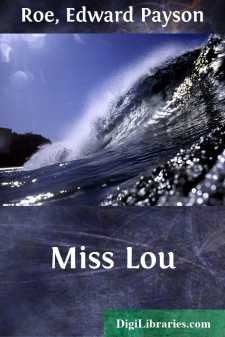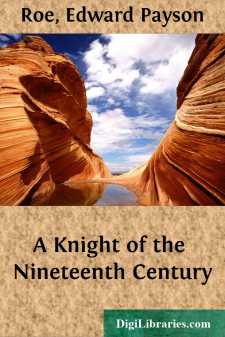Categories
- Antiques & Collectibles 13
- Architecture 36
- Art 48
- Bibles 22
- Biography & Autobiography 813
- Body, Mind & Spirit 142
- Business & Economics 28
- Children's Books 16
- Children's Fiction 13
- Computers 4
- Cooking 94
- Crafts & Hobbies 4
- Drama 346
- Education 46
- Family & Relationships 57
- Fiction 11829
- Games 19
- Gardening 17
- Health & Fitness 34
- History 1377
- House & Home 1
- Humor 147
- Juvenile Fiction 1873
- Juvenile Nonfiction 202
- Language Arts & Disciplines 88
- Law 16
- Literary Collections 686
- Literary Criticism 179
- Mathematics 13
- Medical 41
- Music 40
- Nature 179
- Non-Classifiable 1768
- Performing Arts 7
- Periodicals 1453
- Philosophy 64
- Photography 2
- Poetry 896
- Political Science 203
- Psychology 42
- Reference 154
- Religion 513
- Science 126
- Self-Help 84
- Social Science 81
- Sports & Recreation 34
- Study Aids 3
- Technology & Engineering 59
- Transportation 23
- Travel 463
- True Crime 29
Edward Payson Roe
Edward Payson Roe was a popular 19th-century American novelist and Presbyterian minister known for his sentimental and moralistic novels. Born on March 7, 1838, in New Windsor, New York, he gained widespread fame with works such as "Barriers Burned Away" and "Opening a Chestnut Burr." His novels often dealt with themes of love, faith, and redemption, resonating deeply with his contemporary audience.
Author's Books:
Sort by:
An Autobiography Two or three years ago the editor of "Lippincott's Magazine" asked me, with many others, to take part in the very interesting "experience meeting" begun in the pages of that enterprising periodical. I gave my consent without much thought of the effort involved, but as time passed, felt slight inclination to comply with the request. There seemed little to say of...
more...
Left Alone The dreary March evening is rapidly passing from murky gloom to obscurity. Gusts of icy rain and sleet are sweeping full against a man who, though driving, bows his head so low that he cannot see his horses. The patient beasts, however, plod along the miry road, unerringly taking their course to the distant stable door. The highway sometimes passes through a grove on the edge of a forest,...
more...
PREFACE A book should be judged somewhat in view of what it attempts. One of the chief objects of this little volume is to lure men and women back to their original calling, that of gardening. I am decidedly under the impression that Eve helped Adam, especially as the sun declined. I am sure that they had small fruits for breakfast, dinner and supper, and would not be at all surprised if they ate some...
more...
"I am getting very tired," said a hard brain-worker to me once. "Life is beginning to drag and lose its zest." This is an experience that can scarcely happen to one who has fallen in love with Nature, or become deeply interested in any of her almost infinite manifestations. Mr. and Mrs. Clifford of my story are not wholly the creations of fancy. The aged man sketched in the following...
more...
No race of men, scarcely an individual, is so devoid of intelligence as not to recognize power. Few gifts are more courted. Power is almost as varied as character, and the kind of power most desired or appreciated is a good measure of character. The pre-eminence furnished by thew and muscle is most generally recognized; but, as men reach levels above the animal, other qualities take the lead. It is...
more...
CHAPTER I A HERO, BUT NOT HEROIC "Shall I ever be strong in mind or body again?" said Walter Gregory, with irritation, as he entered a crowded Broadway omnibus. The person thus querying so despairingly with himself was a man not far from thirty years of age, but the lines of care were furrowed so deeply on his handsome face, that dismal, lowering morning, the first of October, that he seemed...
more...
CHAPTER I A GIRL'S PROTEST A great, rudely built stone chimney was smoking languidly one afternoon. Leaning against this chimney, as if for protection and support, was a little cabin gray and decrepit with age. The door of the cabin stood wide open, for the warm spring was well advanced in the South. There was no need of a fire, but Aun' Jinkey, the mistress of the abode, said she...
more...
CHAPTER I BAD TRAINING FOR A KNIGHT Egbert Haldane had an enemy who loved him very dearly, and he sincerely returned her affection, as he was in duty bound, since she was his mother. If, inspired by hate and malice, Mrs. Haldane had brooded over but one question at the cradle of her child, How can I most surely destroy this boy? she could scarcely have set about the task more skilfully and...
more...
Just ten years ago I took my first hesitating and dubious steps toward authorship. My reception on the part of the public has been so much kinder than I expected, and the audience that has listened to my stories with each successive autumn has been so steadfast and loyal, that I can scarcely be blamed for entertaining a warm and growing regard for these unseen, unknown friends. Toward indifferent...
more...
CHAPTER I THREE GIRLS It was a very cold blustering day in early January, and even brilliant thronged Broadway felt the influence of winter's harshest frown. There had been a heavy fall of snow which, though in the main cleared from the sidewalks, lay in the streets comparatively unsullied and unpacked. Fitful gusts of the passing gale caught it up and whirled it in every direction. From roof,...
more...











